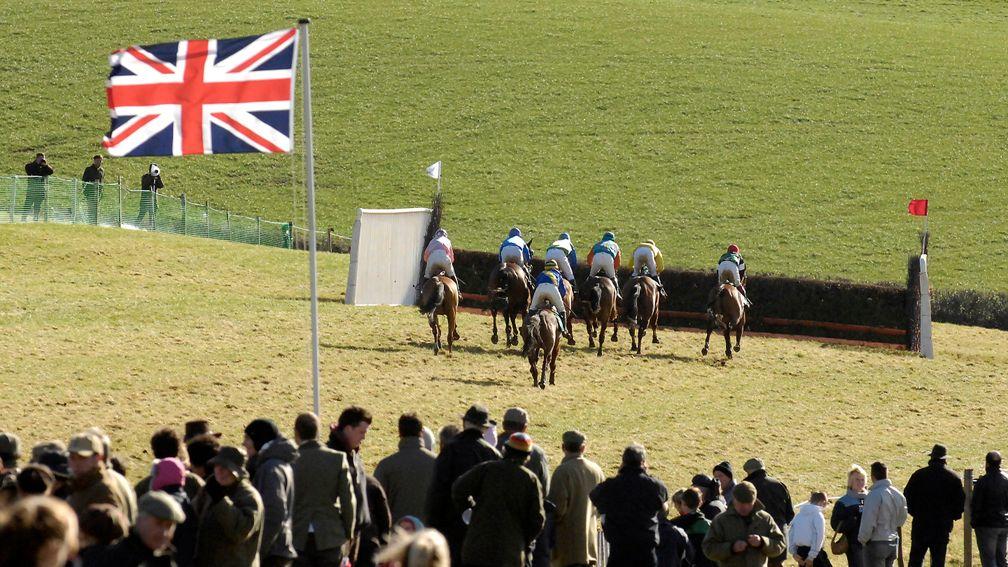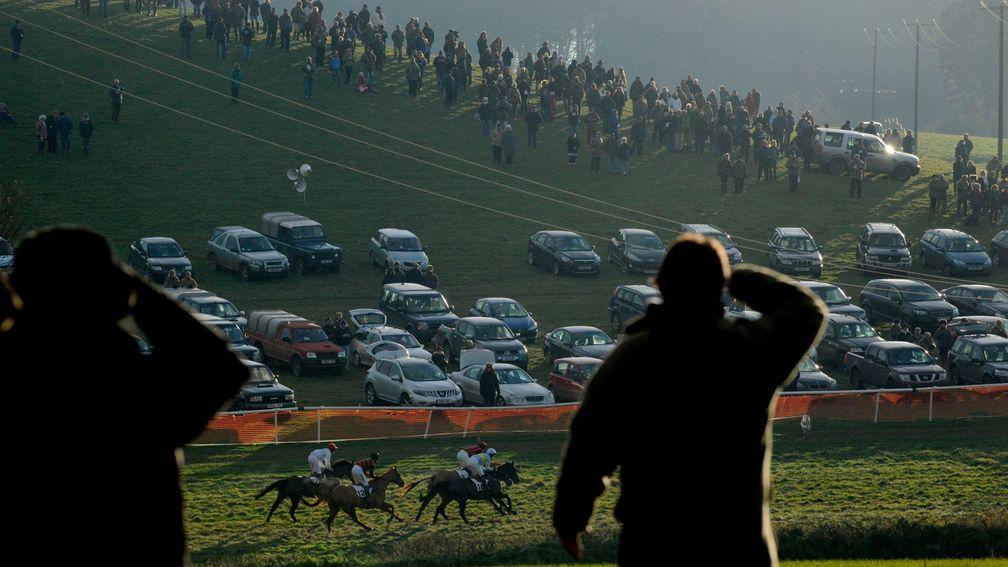Pointing the way to help ease racing's stable staff crisis

Following on from my article on the stable staff crisis I thought it important to shed some light on a positive aspect of our sport which could be an answer to keeping staff in racing.
Philip Hobbs recently spoke fondly of point-to-pointing in an article in the Racing Post and made the very good argument that pointing is a great way to retain staff in licensed yards. I completely echo this sentiment and on a personal and a practical level will give my opinion on why the longevity of point-to-pointing may be paramount to keeping people in racing.
I have participated in point-to-points myself, training my own horse and riding him in his races. I have also been fortunate enough to have ridden for another point-to-point trainer, Janet Ackner. I've not experienced any other feeling in the world like the one I get when riding my horse in a race – it is an adrenaline rush second to none.
The work is hard and laborious and the expense is high, but I'd advise anyone not to let that stop you. You will have to make sacrifices, financially and in terms of time but you will gain so much as a result. You will not only become a better rider but you will also grow as a person as training your own pointer provides you with all of the highs and lows needed to develop your character.
I have experienced said highs and lows in every possible outlet. I bought my horse from the Ascot Sales in September 2014 and since then we have had brilliant results in which he gave me the most amazing rides. However, we have also encountered our fair share of injuries as he suffered a double suspensory in our first season and a tendon injury last season.
My boy has been retired as a result of this most recent injury and is currently recuperating, hopefully to live a long life as a happy hack. Despite all the setbacks and frustrations these injuries put us through, I still wouldn't have changed a thing. The days we set foot on the racetrack and the thrill of a decent result completely outweigh any anguish endured.
Point-to-pointing has long been synonymous with staff working in licensed National Hunt yards, with many people taking part in both. Working in a professional yard lends itself to an employee perfectly when training a point-to-pointer.
The long lunch breaks allow you to exercise your horse properly without fear of time pressures or light issues in the winter. You are also already in your riding/yard gear so it is very easy to just transfer yourself to your horse and continue where you left off.
I have been very fortunate to have worked for a supportive trainer in Philip Hobbs, who let me use the gallops and schooling facilities free of charge. Mr Hobbs also allowed me the use of his horsebox to take my horse racing. Many yards wouldn't be this generous so I've been very lucky in that sense.
The majority of trainers will encourage their staff to have point-to-pointing as their outlet and will support their staff in this. Many trainers will even give a horse who is retiring from their yard to a budding point-to-pointer. I have heard of many instances where the trainer will even let their staff keep their horse at the yard and they are able to ride out their own horse with the main string.
I believe encouraging and aiding people who wish to point-to-point will improve the stable staffing crisis even just a little. People who participate in pointing become engrossed in the sport, even more so than if they were just working in racing.
It improves riding abilities and confidence, which is a huge positive for staff, trainers and horses alike. It is also a great social outlet with various different events, all dedicated to pointing. Aside from the obvious racedays, there are also balls, barn dances, parties and just general social meet-ups.
It feels like the pointing world is more of a community with almost everyone involved being supportive of each other's success.

Pointing is a great stepping stone for budding jockeys and trainers to get their first flavour of future work. There is no better place to hone your riding skills than in point-to-points as it allows you to make mistakes without the scrutiny of a television audience. You are able to get a feel for race pace, riding in a field of horses, riding at speed over a fence and pushing out a finish. None of these skills can be reproduced to the same extent in any other context.
You are able to gain experience at home as well, with many point-to-point trainers wanting young jockeys to ride their horses in work and schooling sessions. This, again, is mostly done in the breaks provided by a person's work.
It is an all-encompassing industry that works parallel to the National Hunt world. Potential trainers are also able to begin their career in pointing.
There are always horses for sale – many novice trainers will buy something experienced so the horse can teach them as much as they can teach the horse. An older horse often will tell you when it's race-fit or, on the other hand, if there is a physical issue and it can't race. Given time, trainers may want to buy a store horse and break it themselves to bring on and train. This takes a bit more time and thought as you need a good knowledge of breeding and an appreciation of dealing with young stock.
There is also a market for trainers to purchase a horse, they feel, may not be improving enough to achieve its potential. In this instance a trainer must have a good knowledge of their own training practices and be confident this will improve the horses from its old regime. Every jockey and trainer will have highs and lows but at the same time every one of them will learn so much from pointing without any external pressures.
Another benefit of point-to-pointing is that it provides a home for horses who have been retired from the track. Many horses become sour from racing on the track and this could occur at any age. Pointing tracks are so different to racecourses as they often have undulations, hills, twists and turns while the fences are slightly smaller.
Racing in open countryside with far less railing and barriers can very often sweeten a horse's attitude towards racing. A horse may feel more natural and less pressurised on a pointing track. It is also beneficial that only amateur jockeys are allowed to ride in point-to-points. Many of these riders will be only starting their career and this can also ease pressure on a horse.
Some horses who go into pointing will be those who are simply too high in the handicap to be competitive on the track anymore and need another avenue to turn to. Pointing can provide this, as there isn't the same kind of handicapping system in play. Older horses who just may not have the legs or engine to race professionally anymore can find sanctuary in the amateur world. Pointing is the perfect middle ground between professional racing and complete retirement.
I believe point-to-pointing needs to be given greater emphasis as one of a number of possible solutions to keeping staff in racing. Not only that but pointing is a beacon in our sport and its permanence is paramount for so many reasons. It provides people with a platform to peruse their careers in training, riding or groom work. It enables young horses with a start to their racing career and also sustains older horses' careers with a place before total retirement from the track.
I recommend anyone who is tempted to give pointing a try to go for it and see what you can learn and how it can help you develop, not only as a rider, but also as a person.
Published on inComment
Last updated
- We know that times are tight - but racecourses really do need to step up and improve outdated weighing rooms
- The budget has heaped even more trouble on racing - and I fear many trainers will now decide the numbers just don't add up
- Why I think Cheltenham Festival handicaps need to change - JP McManus writes exclusively for the Racing Post
- No-one has ever emerged from the womb wearing a trilby - racing's future survival hangs on pursuing a young audience
- Four score and ten just a number to Peter Harris as July Cup triumph shows there's more to the elderly than medical conditions
- We know that times are tight - but racecourses really do need to step up and improve outdated weighing rooms
- The budget has heaped even more trouble on racing - and I fear many trainers will now decide the numbers just don't add up
- Why I think Cheltenham Festival handicaps need to change - JP McManus writes exclusively for the Racing Post
- No-one has ever emerged from the womb wearing a trilby - racing's future survival hangs on pursuing a young audience
- Four score and ten just a number to Peter Harris as July Cup triumph shows there's more to the elderly than medical conditions